
Join us in Bangkok on 4 March and Shanghai on 6 March.

As we settle into 2025, I’d like to take a moment to acknowledge the efforts of everyone across the grain industry. The GTA Board and management remain committed to supporting our members and the broader supply chain, ensuring we’re prepared for the year ahead. I look forward to working together in 2025.
Upcoming Changes to Phosphine Fumigation Standards
I am starting to be concerned that the changes proposed by WorkSafe Australia (to commence from December 2026) to the phosphine usage safe work levels may have an impact on the efficiency of the grain supply chain. Phosphine fumigation is the most important tool that the industry has for protecting grain from insect pests and is widely used.
Whilst industry is aware correct usage is essential to ensure compliance, the pending phosphine label changes and updates to WorkSafe Australia standards will place greater responsibility on industry to manage phosphine residues correctly. Under current workplace health and safety (WHS) regulations, Australian grain must not exceed a phosphine threshold limit value – time weighted average (TLV-TWA) of 0.3 parts per million (ppm). This is based on safe exposure levels for an individual working an eight-hour day over a five-day week.
From 1 December 2026, this threshold will be reduced to 0.05ppm, significantly tightening the allowable limits. These changes could create supply chain disruptions and restrict the options for insect management strategies.
I see industry engagement, management and dialogue as important to ensure supply chain disruptions are minimised by this change. GTA, the National Working Party for Grain Protection, and grower association groups are working together to assess the implications of these changes and will soon provide further communications and guidance.
Regional Information & Q&A Sessions
GTA and the Department of Agriculture, Fisheries and Forestry (DAFF) recently hosted two regional forums, in Toowoomba, QLD, and Narrabri, NSW, for GTA members and other industry participants. Understanding the quarantine requirements and regulations for each of the 90 countries which Australian grain is exported is vital for Australian grain trading businesses. These forums provided information and opportunity to discuss solutions for meeting import country requirements. It was also a chance to ask questions and for GTA members to actively contribute to shaping future approaches.
Andrew Goyder, Chair – GTA
Grain Varietal Purity specifications are included in GTA Trading Standards. Industry has highlighted the need for faster, more accurate grain assessment technology—particularly for malt barley and other grain commodities—to determine varietal purity during the receival process.
Currently, Varietal Purity is primarily assessed using DNA testing. However, due to the time and cost involved, DNA testing is not practical as a field reference method at receival and is generally restricted to laboratory use. This gap presents an opportunity for grain assessment technology providers, with some companies now offering in-field testing equipment to determine grain varietal purity at receival stands.
GTA has been approached by providers seeking endorsement for their technology as a field reference method. To support this, GTA’s Technology Sub-Committee has developed a draft Protocol to evaluate new technologies for determining varietal purity, including assessing varietal admixtures across different grain commodities. Where requested by a technology provider, any technology used for this purpose may be assessed under the Protocol.
A trial is scheduled in February to assess one technology provider to determine the reliability and accuracy of the equipment using the draft Protocol. After the trial, the Protocol may be revised based on the findings and will then be made available for industry consultation before final approval and release.
GTA continues to advocate to the Government and the ACCC for reform to address the market power of Container Terminal Operators. GTA has engaged with the ACCC to offer insights into the impact of terminal and Empty Container Park (ECP) fees on the competitiveness of the grain container supply chain.
In December 2024, the ACCC released its 2023–24 Container Stevedoring Monitoring Report. This report marks a significant shift, with the ACCC now formally acknowledging market failures in certain fees and charges imposed by Terminal Operators and ECPs.
The ACCC has specifically called on the Australian Government to consider:
Measures to address market failures related to fixed charges levied by stevedores on transport operators.
Measures to address the apparent market failures relating to incentive-based charges, levied by stevedores, including the appropriateness of stevedores’ weight misdeclaration fees.
Closer scrutiny of empty container parks to assess whether the apparent market failures relating to notification fees need to be addressed, either through the measures identified for stevedores or other regulatory actions.
While the Government is not obligated to act on these recommendations, GTA will highlight this report in advocacy efforts with both major parties leading up to and following the next federal election.
The International Grain Trade Coalition Association (IGTC) is a non-profit federation of country associations dedicated to promoting and facilitating the efficiency of the global supply chain for grains, oilseeds, pulses, and derived products.
GTA has recently joined several IGTC Working Groups focused on key trade issues:
International Trade Advocacy – Supporting a stable, rules-based global trading system by engaging in forums such as the WTO, countering anti-trade sentiment, and positioning IGTC as a trusted advisor on trade policy.
Electronic Documentation – Enhancing trade efficiency through digital tools like ePhytos, reducing delays and costs, and exploring broader opportunities for digitalisation.
Non-Tariff Barriers – Addressing regulatory challenges, advocating for harmonisation in areas such as seed innovation and crop protection, and monitoring emerging issues that could impact trade.
These working groups will help align global efforts in these critical areas.

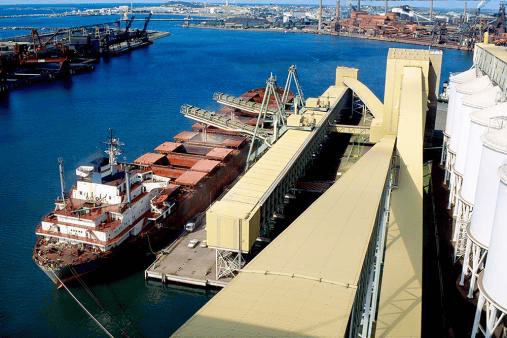
GTA continues to work with Government and industry stakeholders to progress the DAFF Wheat Port Code Review Report’s recommendations. In December 2024, GTA and its members met with the Minister for Agriculture to clarify GTA’s position and support for the Wheat Port Code Review Report’s recommendations.
GTA remains committed to coordinating the process outlined in the DAFF Report, including the development of an industry-led model. GTA has commenced engagement with an industry Working Group to facilitate discussions and design an appropriate self-managed model.
GTA members will be informed as progress and direction is made and will have opportunity to comment and provide input into the potential industry-managed replacement of the regulated Wheat Port Code. GTA’s submission relating to the Final Report on the Second Review of the Wheat Port Code is available to read on the website.
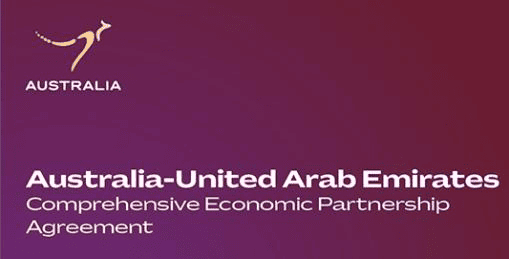
The United Arab Emirates (UAE) is Australia’s largest trade and investment partner in the Middle East, with two-way trade valued at $9.94 billion in 2023 and two-way investment stock worth $20.6 billion. The UAE remains an important market for the Australian grain industry.
On 6 November 2024, Australia and the UAE signed a Comprehensive Economic Partnership Agreement (CEPA)—a bilateral free trade agreement that will strengthen economic ties between the two nations.
The CEPA was tabled in the Australian Parliament on 18 November and is currently under review by the Joint Standing Committee on Treaties (JSCOT). As part of this process, JSCOT invited public submissions, and GTA has provided a submission into the UAE CEPA.

For the first time ever, AGIC Asia is going to India!
Join industry leaders, innovators, and experts in Mumbai as we explore the latest trends, solutions, and opportunities in agribusiness across Asia.
For more information and to find out about sponsorship opportunities, contact Julia Love, Conference Convenor, at agic@ausgrainsconf.com.
GTA CEO, Pat O’Shannassy, recently participated in a global panel at the virtual policy seminar Trade Disruptions and Their Impacts on Agricultural Markets: Looking Back and Ahead, co-organised by the International Food Policy Research Institute (IFPRI) and the Agricultural Market Information System (AMIS).
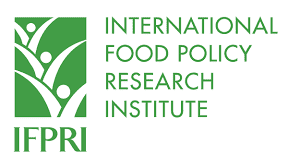 The seminar explored how global agricultural markets and supply chains have adapted to disruptions such as trade tensions, the pandemic, Russia’s war in Ukraine, the Middle East crisis, and export restrictions. These issues have altered trading patterns, increased price volatility, and led to less efficient markets with higher costs.
The seminar explored how global agricultural markets and supply chains have adapted to disruptions such as trade tensions, the pandemic, Russia’s war in Ukraine, the Middle East crisis, and export restrictions. These issues have altered trading patterns, increased price volatility, and led to less efficient markets with higher costs.
Moderated by leaders from the Food and Agriculture Organisation (FAO) and IFPRI, the event featured speakers from Australia, the USA, Egypt, and Africa.
Pat shared insights on the Australia-China barley trade dispute, explaining how Australia used a methodical, respectful approach and WTO rules to resolve the issue. He highlighted that the dispute tested the system both Australia and GTA support, showcasing the value of a rules-based framework in addressing trade challenges and demonstrating how ultimately WTO rules provided a pathway to resolution.
Pat also discussed the adaptability of grain markets. When Australian barley lost access to China, exports shifted to Saudi Arabia, North Asia, Southeast Asia, and smaller volumes to Mexico and Latin America, while the EU, Canada, and South America filled China’s needs at different prices.
He noted grain traders essentially trade three things—logistics, weather, and global politics. The unpredictability of these creates risk, making diversification in market access and business relationships vital for resilience and flexibility in responding to disruptions.
The seminar reinforced the need for robust systems and diversified strategies to protect agricultural trade in a constantly changing global environment. You can watch the recording here.
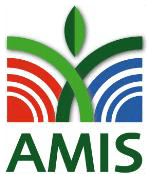
The seminar was co-organised by the International Food Policy Research Institute (IFPRI) and the Agricultural Market Information System (AMIS). IFPRI is a global research organisation that addresses food insecurity and malnutrition through evidence-based policy solutions. AMIS, an initiative by the G20, promotes market transparency and food security by providing accurate global food market data.

It is a milestone year for the Australian Oilseeds Federation (AOF) as they mark 55 years of representation of the Australian oilseed industry. While AOF was established in 1970, the drive for industry growth began in earnest in the early 1990s with the development of its first 5-year industry development plan. Since then, AOF has continued to guide and facilitate industry development and growth through its strategic plans.
In 2025, AOF will commence its next 5-year plan and will work closely with industry stakeholders across the domestic supply chain to chart the course to 2030 and beyond. Key focus areas will include sustainability, and developments in the fuel, food, and feed sectors.
In addition to developing the 5-year plan, AOF will also contribute to the Grains Industry Association of Western Australia (GIWA) Oilseed Council’s WA Grains Industry Strategy 2035+, which covers the entire value chain in Western Australia.

This two-day workshop is ideal for those starting in the grain industry, as well as participants from other sectors seeking a general understanding of the industry. It’s a condensed, simplified version of four GTA core workshops and covers the basics of:
This is a great opportunity to learn from an industry expert. Register here. See Semester 1, 2025 workshops here.
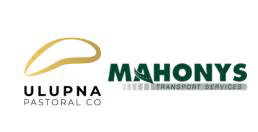
We would like to extend a very warm welcome to the following new members who have recently joined Grain Trade Australia:
We are pleased that these businesses have chosen to become part of GTA and contribute to our mission to “facilitate trade.”
For any member enquiries or ideas, please email admin@graintrade.org.au.
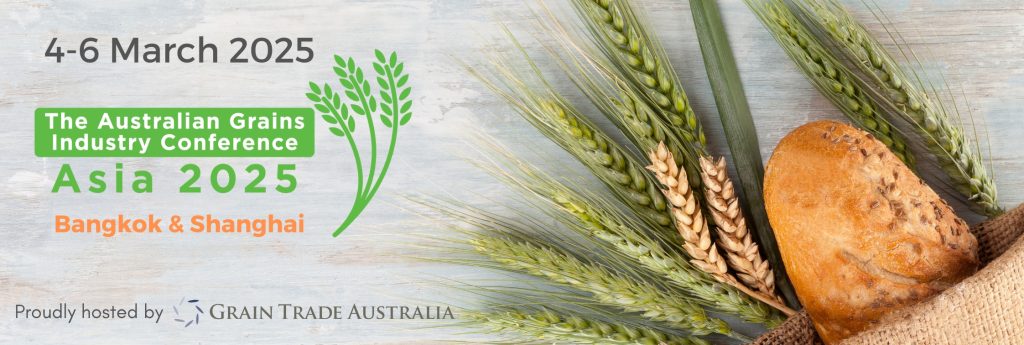
The Countdown is On for AGIC Asia 2025! Mark your calendars—AGIC Asia 2025 is set to take place at the SO/ Bangkok Hotel, Thailand on 4 March, and the Jing An Shangri-La Hotel, Shanghai, China on 6 March.
AGIC Asia is a premier platform for Australian exporters and the Asian grain market, providing valuable opportunities to connect with international buyers, industry leaders, and policymakers. Attendees will gain insights into supply chain trends, Australian grain quality, and the broader global outlook shaping trade dynamics.
Building on the success of past conferences across Asia and virtual events, AGIC Asia 2025 will feature expert speakers covering key topics such as:
In addition to these, there will be two Technical Plenary sessions and engaging Panel Discussions. This is your chance to hear from keynote speakers, technical experts, and decision-makers from Australia, Thailand, and China. Don’t miss it!
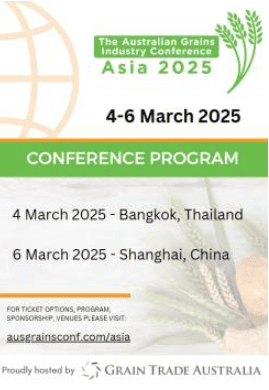 The AGIC Asia 2025 program is now available on the website, offering a preview of
The AGIC Asia 2025 program is now available on the website, offering a preview of
expert speakers and key topics.
Download the Conference Program
We extend our thanks to our sponsors for their support in making AGIC Asia possible.
Only a few sponsorship opportunities remain please email Julia Love, Conference Convenor at agic@ausgrainsconf.com for details.

NWPGP Conference returns on 4–5 June 2025 at Sofitel Melbourne on Collins Street, chosen to accommodate growing delegate numbers and increased sponsor interest. This essential event brings together the grains industry to discuss market needs, pest management, pesticide residues, grain protection, application technology, and control methods.
Connect with experts from government, industry, and research bodies for critical insights and discussions. With virtual access available, the conference offers flexibility for both in-person and remote attendees.
Past participants rate the program’s relevance at 100%, with 99% valuing the networking—don’t miss out!
Sponsorship Opportunities
Showcase your brand to senior professionals across the grains industry. Sponsorship includes:
✔ Enhanced visibility through the conference app and two-day program
✔ Direct access to key decision-makers in government, research, and the commercial sector
✔ Exposure to both in-person and virtual attendees
Download the Conference Prospectus and secure your spot early to maximise your brand’s reach and impact
Registrations are now open for this key industry conference.
We can’t wait to welcome you! Stay tuned for program updates.
Grain Matters Edition 103 – December 2025
11 December 2025
Grain Matters Edition 102 – November 2025
10 November 2025
Grain Matters Edition 101 – October 2025
9 October 2025
Grain Matters Edition 100 – September 2025
10 September 2025
Grain Matters Edition 99 – August 2025
12 August 2025
Grain Matters Edition 98 – July 2025
14 July 2025
Grain Matters Edition 97 – June 2025
13 June 2025
Grain Matters Edition 96 – May 2025
11 May 2025
Grain Matters Edition 95 – April 2025
11 April 2025
Grain Matters Edition 94 – March 2025
11 March 2025
Stay updated on industry news and events. Subscribe now for exclusive updates and insights!
Self Regulatory Framework
NEWS
Self Regulatory Framework
NWPGP
NEWS
Events
Street Address
Level 7
12 O'Connell Street
Sydney NSW 2000
Postal Address
PO Box R1829
Royal Exchange
Sydney NSW 1225
Street Address
Level 7
12 O'Connell Street
Sydney NSW 2000
Postal Address
PO Box R1829
Royal Exchange
Sydney NSW 1225